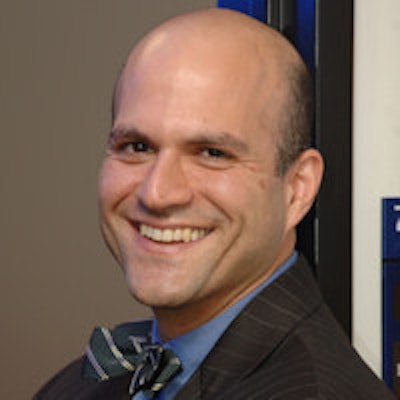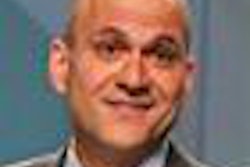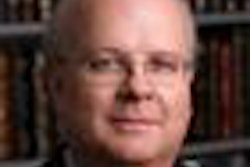
The U.S. Office of the National Coordinator for Health Information Technology (ONC) has ambitious plans for the meaningful use IT stimulus program as it seeks to drive the universal adoption of "smart" healthcare, according to ONC head Dr. Farzad Mostashari.
 Dr. Farzad Mostashari discussed the goals of the ONC meaningful use IT stimulus program at HIMSS 2013. Image courtesy of HIMSS.
Dr. Farzad Mostashari discussed the goals of the ONC meaningful use IT stimulus program at HIMSS 2013. Image courtesy of HIMSS.
In 2013, ONC's three core priorities are to make meaningful use as meaningful as it can be, push through opportunities to maximize interoperability and exchange of patient data, and support e-health consumerism. The long-term vision for the U.S. government's meaningful use IT stimulus initiative is the universal adoption of smart healthcare, powered by the communications capabilities of the 21st century and global access to knowledge and information, according to Mostashari.
Mostashari and his leadership team shared their goals for the program during a town hall get-together at the Healthcare Information and Management Systems Society (HIMSS) annual meeting in New Orleans. The session provided an informal setting for attendees to put faces and personalities to the ONC bureaucracy, ask questions, and hear firsthand what was on their minds.
In addition to Mostashari, the lineup included the following:
- David Muntz, principal deputy national coordinator
- Judy Murphy, RN, deputy national coordinator for programs and policy
- Dr. Doug Fridsma, PhD, director of the Office of Standards and Interoperability and director of the Office of Science and Technology
- Dr. Jacob Reider, director of the Office of Chief Medical Officer
- Jodi Daniel, JD, MPH, director of the Office of Policy and Planning
- Lygeia Ricciardi, director of the Office of Consumer eHealth
- Mat Kendall, MPH, director of the Office of Provider Adoption Support
- Joy Pritts, chief privacy officer
- Kelly Cronin, health care reform coordinator
2013 plans
With ONC facing the impending federal budget cuts, ONC's resources will be "a little less," but its enthusiasm and drive to succeed will be just as high, the ONC team repeatedly emphasized.
Established in 2012, the Office of the Chief Medical Officer is now very active in 2013. Its five physicians and four nurses represent clinicians' interests, needs, and frustrations while working with the standards policy, patient engagement, and other ONC teams, Reider said. He acknowledged that clinicians' needed an internal ONC voice, something that had been made very clear by medical specialists in 2011 and 2012. Stage 1 requirements showed that the ONC's focus on primary care physicians did not address the complexities of the healthcare environment and its clinical specialties, he said.
Reporting of clinical quality measures has been a challenging task due to diverse agency requirements. An attendee asked the ONC team if there would be one source for all clinical quality measures, as it could be difficult to attain meaningful use if many programs require the reporting of different quality measures.
"We know that the hospital reporting program and the meaningful use program feel and act differently than other programs," Reider acknowledged. The ONC is working to align everything, he said, but at this point in time, didn't know the time frame for completion of this effort. The Agency for Healthcare Research and Quality (AHRQ) website offers a single source that lists all the clinical quality measures defined in stage 1 and stage 2 meaningful use rules, Reider noted.
Interoperability
Fridsma and Murphy tackled questions relating to interoperability. The town hall audience was particularly interested in learning how the ONC intends to support healthcare IT standards and efforts after the end of the meaningful use initiative.
The Health Information Technology for Economic and Clinical Health (HITECH) Act gave the ONC responsibility for establishing standards and implementation guides, an authority which was not tied to the federal incentive payment program, Murphy explained. The ONC's job won't end at the completion of meaningful use payments, she noted.
In stage 2, health IT vendors were required to employ user-centered design principles for testing electronic health records, Fridsma said.
"We're hoping that this increases the likelihood that systems will anticipate user workflow needs instead of frustrating them," he explained.
Murphy was quick to point out that interoperability issues are complicated, and discussed this topic in depth. They have been much more difficult to execute than ONC originally expected. As a result, stage 2 meaningful use rules are pushing interoperability, she said.
Creating trust relationships among entities that are exchanging data also is important, Murphy added. Sharing data with a known entity is easier, and Murphy and others acknowledged that they had heard concerns about sharing patient data with competitors. The ONC said it would take a tough stand on providers who might inappropriately try to benefit from this, but specifics weren't discussed at this town meeting.
Privacy and security
Privacy and security issues weighed on the audience's minds. Pritts talked about the concerns the ONC had about cybersecurity matters. She emphasized that privacy protection and security implementation are incorporated in everything that the ONC does. Pritts told town hall attendees that they, as healthcare IT professionals, need to focus much more on cyberthreats and cybersecurity protection.
Pritts emphasized that healthcare providers are the entities responsible for installing physical safeguards, maintaining them, and establishing a culture of security and alertness to potential security breaches. Mostashari reinforced Pritts' comments, saying that the ONC was ensuring that privacy was a top issue at all times and enforced.
With respect to the thorny issue of encrypting data provided to patients, Pritts said that it is the responsibility of patients to secure their electronic personal health information, but that nobody can enforce this. If providers notify patients who request access to their records in unsecured formats that this is not a safe means of protecting the data, they will have legally done their job.
"We have given people the tools," Pritts said. "We have given people a get-out-of-jail-free card if they do encrypt their data. But we recognize that patients sometimes just want their data. They have that right to get it."
The ONC consulted with the U.S. Department of Health and Human Services, and was told that as long as a provider warns a patient about potential consequences of unencrypted data, the provider will not be held liable, Pritts added.
Consumer e-health
Consumer e-health is big at the ONC. The agency has implemented a "three A strategy" of access, action, and attitude, Ricciardi explained. Consumers of healthcare are not nearly as engaged as they should be in providing input to and helping manage their healthcare records, she said. Patients need to be encouraged to get access to their health records, work with healthcare providers in various e-health initiatives, and be encouraged share their electronic health information with whomever they think will benefit from having it, Ricciardi stated.
Is the taxpayer getting value from meaningful use?
"This is a really critical issue, especially during a time of a critically tight budget," Mostashari said. "Part of what is challenging is the timeline. We put out the vision for [meaningful use], but it takes a long time to implement and then optimize technology and measure results."
He said that people ask him, "Show me nationwide improvements in quality. I know that healthcare IT can do this and measure improvements." But it's not yet demonstrable on a national scale. It's too early in the implementation timeline, he said.
"What we really need now are local and regional demonstrations," he said. "How many of you have seen a demonstrated improvement? How many of you have written about it? That is what we need. Go do this, so we can read about it, learn from your experiences, and then do this too."
Every encounter that generates knowledge adds to the world's knowledge, Mostashari said. "If we aren't accomplishing that in the next seven years, we won't have met the challenges in time," he said.
In summary, the ONC is trying hard, Mostashari said. "Our hope is to be as supportive as we can be," he said. "We won't get everything right, but we will always try our best."
The hour-long dialogue to a standing room only amphitheatre certainly gave that impression.



















